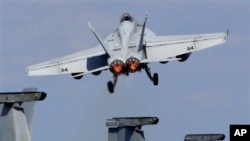U.S. efforts to forge defense industry links with India have been handed a major setback: the Indian air force has eliminated American aviation companies from the competition to supply India with a new generation of fighter jets.
Outgoing Ambassador to India Timothy Roemer said in a statement Thursday the U.S. was "deeply disappointed" to learn that India is no longer considering two advanced American fighter plane models in its $10 billion bid to modernize its air force.
That statement came hours after Roemer formally announced his resignation, citing "personal reasons."
India also rejected Russian and Swedish aircraft, leaving Britain's Eurofighter and France's Dassault Rafale as the finalists in the contest to fill India's order for 126 planes. The U.S. fighters, Boeing's F/A-18 Super Hornet and Lockheed Martin's F-16, were rejected for what Indian officials describe as failure to meet technical criteria.
Viewed as snub
The rejection may be seen as a snub by many in Washington. President Obama personally lobbied senior Indian officials when he was here in Delhi last year. Senior U.S. defense authorities envisioned the deal as a foundation stone in a growing strategic partnership.
But Chintamani Mahapatra, a U.S. studies professor at Delhi's Jawaharlal Nehru University, says it just comes down to business.
"The decision by the government of India is not related at all to the Indo-US strategic partnership," said Mahapatra. "Whoever deserves it, will get it."
Mahapatra points out that India put out an open tender, and is under no obligation to any particular country. He says in an increasingly dangerous world, there is no real risk of the U.S. and India drifting apart.
"I don't think that it is going to be a great setback [in] the bilateral relationship," he said. "It may be a very, extremely transitional hiccup."
India is spending tens of billions of dollars to upgrade its defense capabilities, with an eye primarily on rival Pakistan to the west, and Pakistan's strategic partner, China, to the east.
Process of elimination
The Indian air force has not made public any of the criteria it used in eliminating the American fighters from consideration. Jasjit Singh, director of the Center for Air Power Studies in Delhi, wonders whether the complexity of criteria in the competition may have caused planners to lose sight of the bigger picture.
"My own choices might have been different," said Singh. "At this point in history, the United States is far more important to India than any European country - for the simple reason that the European countries simply do not have the capacity, economic, technological, or otherwise, that can match the U.S. capabilities."
Thursday's statement from the U.S. Embassy in Delhi says Indian officials have given their assurance the fighter selection process will be "transparent and fair." It adds that Washington looks forward to continuing to grow and develop its defense partnership with India.
US 'Deeply Disappointed' by Indian Fighter Deal Setback
- By Kurt Achin




